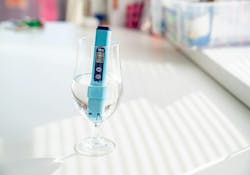NSF launches protocol for water quality testing devices’ performance
The National Sanitation Foundation (NSF) announced that it has launched a new protocol for water quality testing devices for drinking water, titled NSF P524.
NSF P524: Water Quality Test Devices for Drinking Water is the first-ever protocol that provides a standard third-party validation of the performance of water quality testing devices (WQTD) used in drinking water, ensuring public health protection by providing assurance that these crucial devices perform according to the manufacturer's claims.
The new protocol has been developed through collaboration between NSF’s leading experts and industry experts including manufacturers and public health officials. Until now, manufacturers of potable water WQTDs could only advertise performance claims based on their own validation testing.
NSF P524 covers any device, sensor or test kit used to measure water quality parameters in drinking water where the operation of the kit does not require access to lab facilities or equipment and provides results in real-time or after a short wait period. The protocol verifies the manufacturer’s claimed accuracy and precision for the device across its claimed operating range. Certification testing verifies the claims by comparing measurements taken with the device to established laboratory reference methods.
The protocol is designed to validate WQTDs that measure a variety of water quality parameters, including but not limited to metallic and organic, and microbial contaminant concentrations, turbidity, total suspended solids, alkalinity, and hardness. Certification to NSF/ANSI/CAN 61 is a prerequisite for in-line WQTDs that contact drinking water.
By verifying the manufacturer’s performance claims, the protocol provides assurance that water quality testing devices are consistent and reliable, allowing users to make informed decisions about drinking water quality. The protocol also provides a framework for manufacturers to evaluate their devices and make improvements to their accuracy and precision.
“Access to clean and safe drinking water is a fundamental right, and it is essential that we have reliable tools to measure the safety of our water supply. The launch of NSF P524 for water quality test devices is a significant step forward ensuring users have access to accurate information about the safety of their drinking water,” says Dave Purkiss, vice president of NSF’s Global Water Division. “Having this protocol available for water quality testing devices used for drinking water helps provide confidence to utilities and other users that these products are suitable for use in our water systems.”
NSF says that the launch of the new protocol is a milestone in the efforts to improve the accuracy and reliability of water quality testing devices. It will help to ensure that people have access to safe and clean drinking water and will support the continued development of high-quality water quality testing devices.
